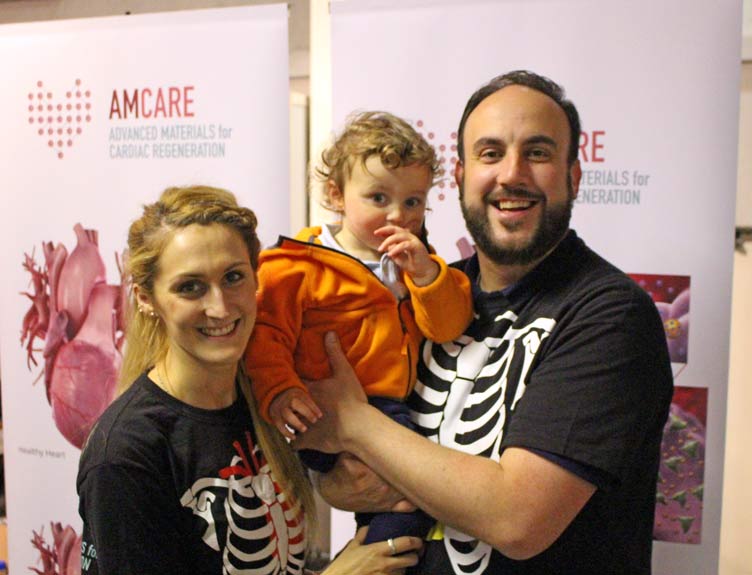Discover Research Dublin 2015 to open eyes and minds to world of Irish research

Over 60 engaging events form the schedule for European Researchers’ Night coordinated by Trinity College Dublin in collaboration with RCSI.
Trinity College Dublin and the Royal College of Surgeons in Ireland (RCSI) will again offer the public an incredible opportunity to get up close and personal with the world of research – and researchers – at Discover Research Dublin tomorrow evening Friday, 25 September.
This year’s event was jointly launched earlier this week by Dr Patrick Prendergast, Provost and President of Trinity College and Mr Declan Magee, President, RCSI at a special event hosted by the Science Gallery and Trinity Biomedical Sciences Institute (TBSI). A panel discussion about the huge potential of big data in medicine set the tone for the curious to open their minds to research and the way it influences us all.
Building on the success of 2014’s event, which saw thousands of people descend upon Trinity to engage with research and researchers, this year’s helping features over 50 exciting, interactive events and demonstrations that will take place in and around central Dublin.
Discover Research Dublin showcases what researchers really do and why research matters. Exploring abstract and practical questions through a variety of unique digital and traditional formats including interactive installations, apps and social media, debates, digital archives, tours and presentations Discover Research Dublin will feature something for everyone.
Participants can immerse themselves in 3D visualisations of the brain, control computers with nothing but their minds, and create colourful visualisations of the music they play with magnetised instruments. The Robotics and Cybernetics Showcase will display how engineers are creating robots to help the elderly and those living with disabilities, while the Dublin Language Garden will explain how linguistics evolve and teach people to speak a language like a local in a mere five minutes.
Children, meanwhile, will take part in real-time experiments to find out which bacterial beasties live in their mouths and meet a friendly tarantula in the Zoology Museum while hearing how researchers combine fossil data with high-tech computers to learn how T-rex lived his life millions of years ago.
People can also go behind the scenes at the Trinity Biomedical Sciences Institute (TBSI), where cutting-edge medical and scientific research takes place. Visitors will enjoy tours of the labs, where researchers will explain how technology allows them to make life-saving breakthroughs and design drugs that are revolutionising the treatment of diseases.
Additional highlights will see visitors help astrophysicists rank the severity of solar eruptions seen in the Sun, look to the heavens in the Monck Observatory, consider the biodiversity in our everyday lives, hear about the Trinity Medical Graduates lost in World War I, and enjoy operatic performances that deal with themes of memory and identity.
In a world increasingly reliant on technology, the Future Cities Showcase will provide snapshots of how we can exploit ICT advances to share resources, promote sustainability, and improve quality of life for the huge proportion of the world’s growing population that is confined to cities.
RCSI will showcase three initiatives on the night in the Hamilton Building. DRIVE Against Diabetes will show how patients with diabetes can be freed from daily insulin injections with the help of long-lasting gel injections loaded with insulin-producing cells being developed by RCSI researchers. Helping the Body to Heal Itself from the RCSI Tissue Engineering Research Group (TERG) will showcase how scaffolds are used in the body to regenerate tissue and restore normal tissue function and Mending Broken Hearts Scientists from the Advanced Materials for Cardiac Regeneration (AMCARE) project will show visitors what happens in the body during and after a heart attack and how regenerative therapies are being used to treat the damage caused by heart attacks.
Cliona O’Farrelly, Professor of Comparative Immunology at Trinity College Dublin (TBSI) and leader of Trinity’s contribution to what is a Europe-wide Discover Research initiative, is delighted by the rich variety on offer. She said: “This event is a wonderful opportunity to engage people in the amazing research that takes place at Trinity, and to allow the people behind the work to tell their unique stories in an interactive, accessible, engaging way.”
“Last year’s event was a huge success but 2015’s offering will build on that by bringing even more to the masses. The individual events will engage the young and old alike - all that is required is a natural curiosity and an appetite to learn something new.”
“Research is about investigation and discovery, and we are keen to show everyone how dynamic the process is. We are also delighted to challenge the stereotypes that are sometimes attached to ‘researchers’ by showing just how varied the people behind tomorrow’s real-world solutions truly are.”
Professor Ray Stallings, Director of Research RCSI, said: “Discover Research Dublin is part of a European wide initiative that is taking place simultaneously in more than 30 countries across Europe with over 300 cities involved. RCSI is excited to be involved in the event, in partnership with Trinity College, to showcase in fun and interactive ways, what our researchers really do for society."
The events, all of which are open to the public, will take place between 4pm and 10pm, Friday, 25 September. Note that all events are free but they have different start and end times, and some require pre-registration. A full programme of events can be found on www.discoverresearchdublin.com.



